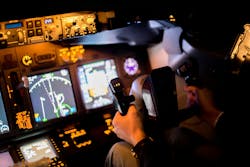WASHINGTON - The Federal Aviation Administration (FAA) has named the National Flight Training Alliance (NFTA) as its industry partner in the effort to modernize 14 CFR Part 141, the regulatory framework governing flight training programs.
The FAA announced the partnership on 27 December, and tasks NFTA with collaborating with flight training providers and the general aviation industry to develop updates to regulations.
Starting in January 2025, the FAA and NFTA will begin outreach to industry stakeholders and flight training providers to gather input and coordinate efforts. Formal meetings are set to take place nationwide, both virtually and in person, beginning in March 2025. More information from the FAA is available here.
Related: AirAsia India selects CAE's AI-powered training system
"This is the first FAA/association partnership of its kind, and NFTA is grateful to the FAA for selecting our organization for this historic and key role in flight training modernization," said NFTA CEO Captain Lee Collins. "In just three years since its founding, NFTA has gathered a deep bench of experienced industry leaders and doers in flight training who are committed to ensuring that government rules and guidelines regarding flight training are consistent with and supportive of innovative best practices in modern flight training."
The modernization effort will focus on several priorities. NFTA plans to develop a new regulatory framework designed to remove obstacles to efficiency in today’s flight training environment. It will work to integrate emerging technologies and updated training methods aimed at improving student outcomes and professional qualifications.
Another goal is to enhance efficiencies in flight training, which the organization hopes will result in tangible cost reductions for students, lowering barriers to entry for aspiring pilots. NFTA also seeks to expand participation in modernization efforts by engaging a broad range of flight training providers to move beyond the current fragmented approach.
Related: A look at the evolution of flight training
The initiative emphasizes the importance of adopting data-driven standards and incorporating safety management systems into flight training operations. Additionally, NFTA aims to improve training quality across all levels of aviation to strengthen overall system safety.
"We see this anticipated level of cooperation and collaboration as ushering in a new era of aviation, and NFTA is eager to advocate for flight training providers and our general aviation colleagues and vendors—in partnership with the FAA—to maximize the safety, quality, and use of advanced technology in professional flight training for the next generation of commercial pilots," Collins said.
About the Author
Jamie Whitney
Senior Editor
Jamie Whitney joined the staff of Military & Aerospace Electronics in 2018 and oversees editorial content and produces news and features for Military & Aerospace Electronics, attends industry events, produces Webcasts, and oversees print production of Military & Aerospace Electronics.
